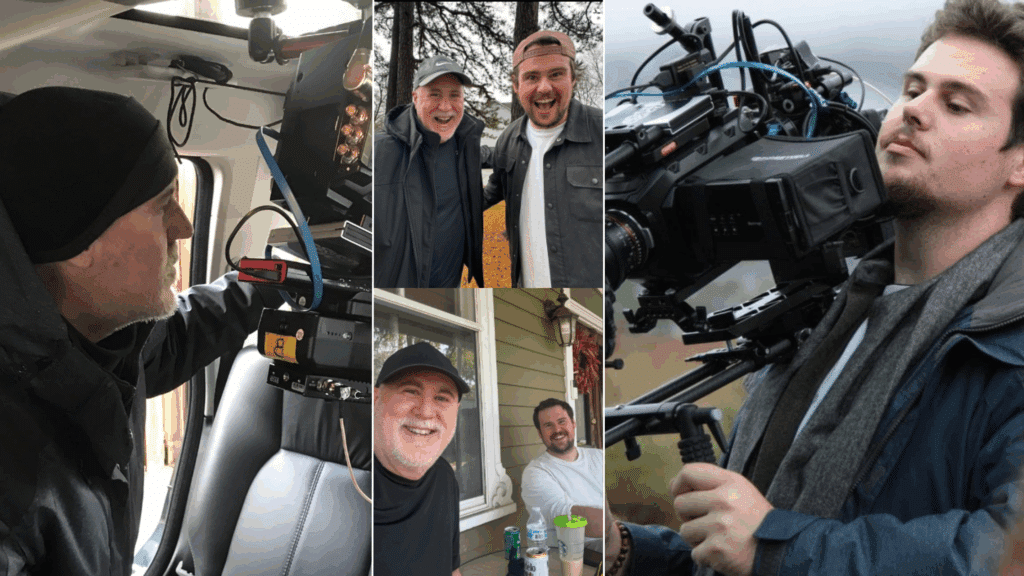
A Family Business in Film — Meet Sean & Taylor King of New Zealand Son Films
For some families, the family business is insurance. For others, it’s medicine. For Sean and Taylor King, it’s filmmaking.
The father-son duo behind New Zealand Son Films have turned their love of storytelling into a full-time, full-scale creative operation. After decades in the industry, Sean — who’s worked as a filmmaker since he was 18 — teamed up with his son Taylor to create projects that are wholly their own. They write together, direct in turns, and keep the entire production pipeline in the family. “If he writes it, it’s his vision,” Sean explains. “If I write it, it’s mine.”
What started with a six-episode indie series became something much bigger. Their projects have appeared on Amazon and other major platforms, and their latest — a limited series called Salem Sisters — is set to release this October.
We caught up with the duo to hear how they’ve built a working dynamic that works, how Salem Sisters came to life, and how Celtx has supported them from script to wrap.
Q&A with Sean & Taylor King
Q: Thanks so much for sitting down with us! Can you tell us who you are and what you do?
Sean:
I went to film school when I was 18 and have worked as a filmmaker my whole life. Taylor is my son — he was in one of our shows when he was seven. We purposely moved away from Hollywood when he was born, but the business still found him.
When he turned 18, instead of film school, we made a six-episode series together. That lined up with the early days of streaming, so we got in with Amazon. Since then, we’ve done around 20 projects, many starting on Amazon and later landing on other platforms. We alternate directing/writing roles depending on who writes the project.
Q: What are you working on now?
Taylor:
We just wrapped a six-episode limited series called Salem Sisters — each episode is around 40–45 minutes. I was literally working on the call sheet before this call.
Sean:
The whole thing was written in Celtx. Then we broke it down — wardrobe, cast info, call sheets, everything. We put wardrobe pictures into the catalog, added all the cast info and addresses. We used it from the idea stage all the way through production.
From wardrobe catalogs to detailed call sheets, Celtx helps keep your production on track — no matter the size of your team. Start your next project with Celtx.
Try it free.
Q: How do you approach production as a two-person team?
Sean:
We keep things lean, which means we need tools that do more than one thing. We use Celtx from script to wrap — everything from cast info to wardrobe, locations, and call sheets gets built into the same pipeline.
Taylor:
And after shooting, we still go back to it — checking call sheets, tracking down what day we filmed a specific scene. It keeps the whole thing moving without losing track of details.
Q: What did you use before Celtx, and what brought you to it?
Sean:
We used other screenwriting software, but the business model didn’t make sense — it was expensive and didn’t include production tools. A lot of filmmakers don’t realize how powerful the production suite in Celtx actually is. They just use the scriptwriting side and ignore the breakdown tools — which is a shame.
Taylor:
The amount of money it saves us is huge. Not realizing we need a prop until the day before and having to scramble? That’s way more costly than the monthly production plan.
Q: How do you handle collaboration?
Sean:
It’s mostly just us — Sean and Taylor. Taylor even draws the storyboards.
Taylor:
We’ve worked with outside writers once or twice and imported their scripts into Celtx. Otherwise, the collaboration is more about crew getting call sheets or prop lists.
Q: What features have become part of your daily workflow?
Sean:
The catalog (wardrobe, props, locations, etc.), breakdown sheets, and call sheets are key. The breakdowns are what we rely on during shoots — lighting cues, wardrobe, effects — everything’s logged.
Taylor:
After 30 shoot days, you can’t rely on memory. That breakdown is everything.

What’s Next for New Zealand Son Films?
With Salem Sisters premiering this fall and new stories always brewing, Sean and Taylor are right where they want to be: telling the stories they care about, on their own terms.
“We don’t have a studio telling us how it needs to end, or who we have to cast,” they shared. “If we want to make a romantic comedy in six months, we can just… do it.” That kind of freedom is rare — and they know it. Their goal isn’t to chase blockbusters or land network deals. It’s to keep making films that find their audience, to keep doing the work they love, and to keep building on what they’ve already accomplished.
“We’d love to reach a point where we don’t have to take on the full financial risk for every project,” they said. “But we’ve learned that doing it ourselves is what lets us stay close to the vision — from the first idea to the final cut.”
It’s a model that works. And Celtx is proud to support that process — offering tools that help filmmakers like Sean and Taylor stay nimble, organized, and in control from day one.
Whatever they dream up next, we’ll be watching. And cheering them on.
Be sure to follow along with Sean and Taylor on Instagram or read more about them and their projects on their website!
No matter the project, no matter the budget — Celtx is built to support storytellers like Sean and Taylor through every stage of production.
See how Celtx can support your next story. Explore Celtx tools!
If you enjoyed this, you might also like:
- Celtx User Spotlight: Wendy Applebaum
- Celtx User Spotlight: Liam Bilsky
- Interview: Umar Turaki On Filmmaking, Writing, and His New Novel
